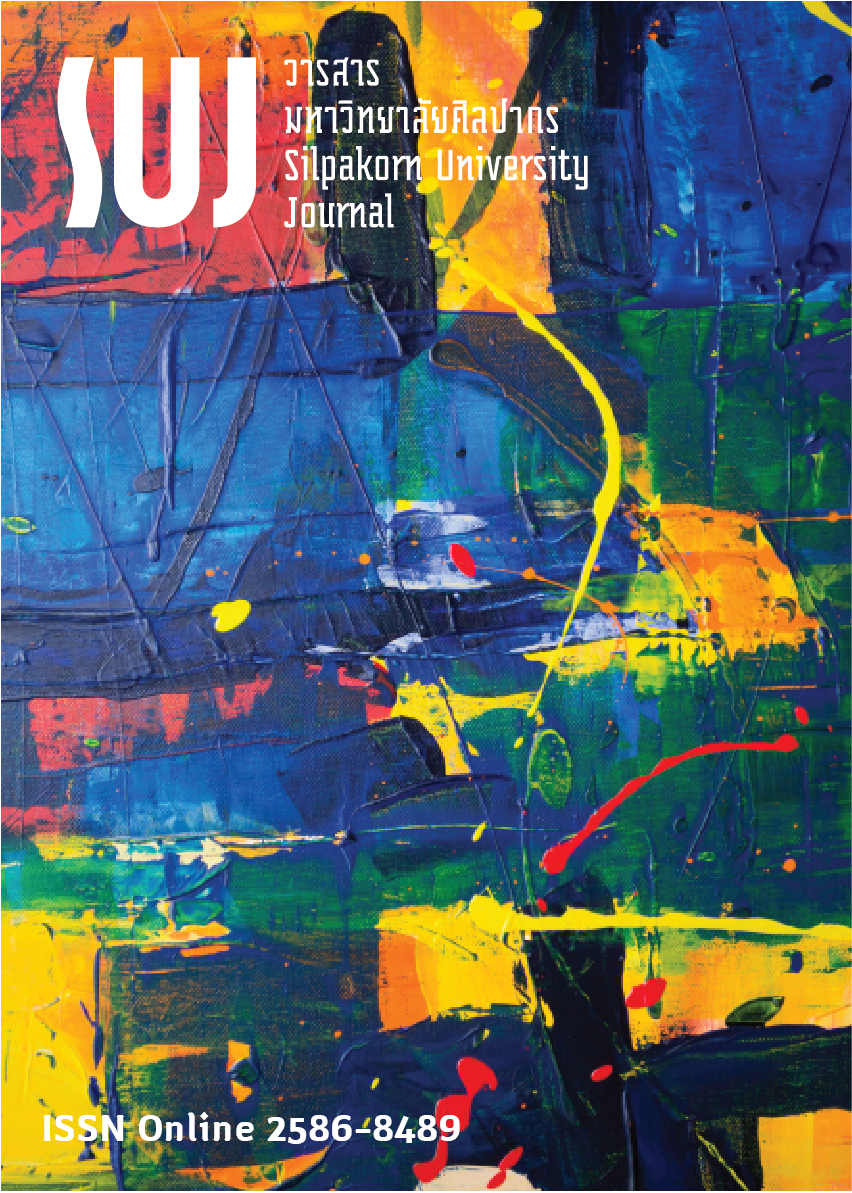อิทธิพลของความเชื่อว่าโลกมีความยุติธรรม และกลวิธีเผชิญปัญหา ที่ส่งผลต่อความเครียดของนักศึกษา (Influence of belief in a Just World and coping strategies on stress among undergraduate students)
Main Article Content
Abstract
งานวิจัยนี้มีจุดมุ่งหมายเพื่อศึกษาอิทธิพลของความเชื่อว่าโลกมีความยุติธรรม และกลวิธีเผชิญปัญหาที่ส่งผลต่อความเครียดของนักศึกษา รวมถึงสำรวจแหล่งที่มาของความเครียดของนักศึกษา เก็บรวบรวมข้อมูลด้วยแบบสอบถาม กลุ่มตัวอย่างเป็นนักศึกษาระดับปริญญาตรี ที่มีอายุระหว่าง 18-24ปี จำนวน 226 คน ผลการศึกษาพบว่า ความเชื่อว่าโลกมีความยุติธรรมส่งผลให้ระดับความเครียดในด้านความสัมพันธ์ระหว่างบุคคลลดลงอย่างมีนัยสำคัญทางสถิติที่ระดับ .01 กลวิธีการใช้อารมณ์ขันส่งผลให้ระดับความเครียดของนักศึกษาในด้านความสัมพันธ์ระหว่างบุคคลและด้านตนเองลดลงอย่างมีนัยสำคัญทางสถิติที่ระดับ .05 และ .01 ตามลำดับ ส่วนบางกลวิธีที่ไม่เหมาะสม ได้แก่ การเพ่งและระบายอารมณ์ การปล่อยปละละเลย และการปล่อยใจ ส่งผลให้ระดับความเครียดของนักศึกษาในด้านความสัมพันธ์ระหว่างบุคคล ด้านตนเอง ด้านปัจจัยทางการศึกษา และด้านสภาพแวดล้อม เพิ่มขึ้นอย่างมีนัยสำคัญทางสถิติ นอกจากนี้ นักศึกษาส่วนใหญ่รายงานว่า สาเหตุของความเครียดเกิดจากความขี้เกียจของตนเองมากที่สุด
This paper examined an influence of a Just World belief and strategies to cope with stress in undergrad students by identifying causations of stress. Questionnaires were distributed randomly to 226 undergraduates aged between 18 to 24. The results revealed that 1) the belief in a Just World led to a reduction in interpersonal stress at the statistical significance level of .01. 2) The humor strategy led to a reduction in interpersonal stress and intrapersonal stress at the statistical significance level of .05 and .01 respectively. Finally, 3) other dysfunctional strategies, including ‘the focusing on and venting of emotions,’ ‘the behavioral disengagement,’ and ‘the mental disengagement,’ led to a significant increase in interpersonal stress, intrapersonal stress, academic stress, and environmental stress. Apart from that, major causations of students’ stress attributed to their laziness.
Article Details
References
Baumrind, D. (1971). Current patterns of parental authority. Developmental Psychology, 4(1, Pt.2): 1-103.
Brcic, J., Suedfeld, P., Johnson, P., Huynh, T. & Gushin, V. (2018). Humor as a coping strategy in spaceflight. Acta Astronautica, 152: 175-178.
Carver, C. S., Scheier, M. F. & Weintraub, J. K. (1989). Assessing coping strategies: A theoretically based approach. Journal of Personality and Social Psychology, 56(2): 267-283.
Cohen, J. (1988). Statistical power analysis for the behavioral Sciences (2nd ed.). Hillsdale, NJ: Lawrence Erlbaum Associates.
Cooper, A. M. (2006). An investigation of coping skills, locus of control, and quality of life in young adults with learning disabilities. Doctoral’s dissertation, Auburn University, Auburn, Alabama, United States. [Online]. Retrieved July 14, 2018, from https://etd.auburn.edu/bitstream/handle/10415/548/ COOPER _AMY_40.pdf?sequence=1
Dalbert, C. (1999). The world is more just for me than generally: About the personal belief in a just world scale’s validity. Social Justice Research, 12: 79-98.
Dalbert, C. (2002). Beliefs in a just world as a buffer against anger. Social Justice Research, 15: 123-145.
Dalbert, C., Lipkus, I. M., Sallay, H. & Goch, I. (2001). A just and an unjust world: Structure and validity of different world beliefs. Personality and Individual Differences, 30(4): 561-577.
Desrumaux, P., Gillet, N. & Nicolas, C. (2018). Direct and Indirect Effects of Belief in a Just World and Supervisor Support on Burnout via Bullying. International Journal of Environmental Research and Public Health, 15(11): 23-30.
Faul, F., Erdfelder, E., Lang, A. G. & Buchner, A. (2012). G*Power 3. [Online]. Retrieved October 18, 2012 from https://www.psycho.uni-duesseldorf.de/abteilungen/aap/gpower3
Furnham, A. (2003). Belief in a just world: Research progress over the past decade. Personality and Individual Differences, 34(5): 795-817.
Heffer, T. & Willoughby, T. (2017). A count of coping strategies: A longitudinal study investigating an alternative method to understanding coping and adjustment. Plos One. [Online] Retrieved September 24, 2018, from https://journals.plos.org/plosone/ article?id=10.1371/journal.pone.0186057
Hemphill, J. F. (2003). Interpreting the magnitudes of correlation coefficients. American Psychologist, 58(1): 78-79.
Kajornsilp, Boonrieng. (1999). Research Statistics 1 (สถิติวิจัย 1) (7th ed.). Bangkok: P.N. Publishing.
Kestner, J. M. (2009). Relating color blind racial attitudes, social dominance orientation and just world beliefs. Doctoral dissertation, Loyola University Chicago, Chicago, Illinois, United States. [Online]. Retrieved September 16, 2018, from https://ecommons.luc.edu/luc_diss/235
Khanthakhuarn, Naphadsagon. (2015). Stress and related factors of the first year undergraduate students of Chulalongkorn University (ความเครียดและปัจจัยที่เกี่ยวข้องกับความเครียดของนิสิตชั้นปีที่ 1 ระดับปริญญาตรี จุฬาลงกรณ์มหาวิทยาลัย). Master’s dissertation, Chulalongkorn University, Bangkok, Thailand.
Lerner, M. J. & Miller, D. T. (1978). Just world research and the attribution process: Looking back and ahead. Psychological Bulletin, 85(5): 1030-1051.
Liao, C., Chen, C. & Shih, S. (2019). The interactivity of video and collaboration for learning achievement, intrinsic motivation, cognitive load, and behavior patterns in a digital game-based learning environment. Computers & Education, 133: 43-55.
Maes, J. & Kals, E. (2002). Justice beliefs in school: Distinguishing ultimate and immanent justice. Social Justice Research, 15(3): 227-244.
Maes, J. & Schmitt, M. (1999). More on ultimate and immanent justice: Results from the research project “Justice as a problem within reunified Germany”. Social Justice Research, 12: 65-78.
Mendo-Lázaro, S., León-Del-Barco, B., Felipe-Castaño, E., Polo-Del-Río, M. & Iglesias-Gallego, D. (2018). Cooperative Team Learning and the Development of Social Skills in Higher Education: The Variables Involved. Frontiers in Psychology, 9: 15-36.
Morelli, S. A., Lee, I. A., Arnn, M. E. & Zaki, J. (2015). Emotional and Instrumental Support Provision Interact to Predict Well-Being. Emotion, 15(4): 484-493.
Myers, D. G. (2017). Social Psychology (12th ed.). New York: MeGraw-Hill.
Nezlek, J. B. & Derks, P. (2001). Use of humor as a coping mechanism, psychological adjustment, and social interaction. Humor - International Journal of Humor Research, 14(4): 395-413.
Oppenheimer, L. (2005). Justice and the belief in a just world: A developmental perspective. Personality and Individual Differences, 38(8): 1793-1803.
Ross, S. E., Neibling, B. C. & Heckert, T. M. (1999). Sources of stress among college students. College Student Journal, 33(2): 312-317.
Saadat, M., Ghasemzadeh, A., Karami, S. & Soleimani, M. (2012). Relationship between self-esteem and locus of control in Iranian University students. Procedia - Social and Behavioral Sciences, 31: 530-535.
Sendi, F., Zadeh, P. E., Asgari, P. & Kafie, M. (2018). The Relationship between Belief in a Just World and Symptoms of Psychological Disorders in Burn Patients: The Intermediate Role of Coping Strategies. International Journal of Psychology, 12(1): 186-207.
Soares, A. B., Mourão, L., Maia, F. A., Medeiros, H. C., Monteiro, M. C., Barros, R. N. & Rodrigues, P. V. (2018). Construction and validity evidence of a scale for coping with difficult social academic interpersonal situations. Psicologia: Reflexão E Crítica, 31(1): 1-9.

